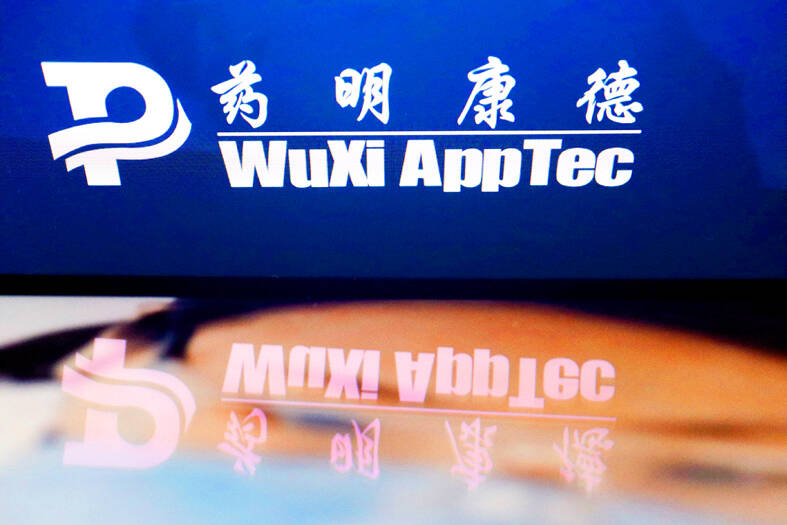The US should review Chinese biotech firm WuXi AppTec (藥明康德) and its affiliate WuXi Biologics (Cayman) Inc (藥明生物) for sanctions, a bipartisan group of lawmakers told top officials of the US President Joe Biden’s administration on Monday.
In a letter dated Monday and seen by Reuters, the lawmakers told US Treasury Secretary Janet Yellen, Defense Secretary Lloyd Austin and Commerce Secretary Gina Raimondo that the global pharmaceutical giant’s links to Chinese Communist Party (CCP) and military threatened US national security.
The letter, signed by the Republican chair and Democratic ranking member of the House Select Committee on China, Representatives Mike Gallagher and Raja Krishnamoorthi, and Senators Gary Peters and Bill Hagerty, is Congress’ latest effort to highlight what it says are risks posed by China’s biotech leaders.

Photo: Reuters
Congress has introduced legislation that would restrict federally-funded medical providers from allowing China’s BGI Group (華大集團), WuXi AppTec and other biotech firms from getting genetic information about Americans.
WuXi AppTec did not respond immediately to a request for comment, but has repeatedly said that it is not a national security risk to any country.
“We are concerned by a misguided US legislative initiative to target our company without a fair and transparent review of the facts,” WuXi AppTec said previously in a statement still on its Web site home page.
The four lawmakers — citing public Chinese government documents, Chinese university Web sites and media articles — outlined what they called WuXi AppTec’s clear military ties, as well as support for China’s policies in Xinjiang, a region where Washington has accused Beijing of committing genocide against Muslim minorities.
They said WuXi AppTec had received investment from numerous Chinese People’s Liberation Army (PLA) funds, including the AVIC Military-Civil Integration Selected Hybrid Securities Investment Fund.
They also cited a resume for WuXi Biologics CEO Chen Zhisheng (陳智勝), posted in 2018 to a Tsinghua University Web site, that listed him as a visiting professor at China’s Academy of Military Medical Sciences, which was added to the US Department of Commerce’s export control list in 2021.
“Given WuXi AppTec’s clear ties to the CCP and the PLA and its likely role in enabling the genocide in Xinjiang, we urge your departments to consider the inclusion of WuXi AppTec and its subsidiaries on your respective control lists,” they said in the letter.
Those should include sanctions under Treasury’s Non-SDN Chinese Military-Industrial Complex Companies List, the Commerce list restricting US sales to named entities and the Pentagon’s “1260H” list, which carries implicit warnings about US cooperation with certain firms.
“WuXi AppTec and WuXi Biologics have obscured their ties to the CCP and PLA and, as a result, are rapidly integrating themselves into US supply chains by signing agreements with prominent US biotech entities,” the lawmakers wrote.
The two companies have counted Pfizer Inc, AstraZeneca PLC, GlaxoSmithKline PLC and US national labs as partners.

Hon Hai Precision Industry Co (鴻海精密) yesterday said that its research institute has launched its first advanced artificial intelligence (AI) large language model (LLM) using traditional Chinese, with technology assistance from Nvidia Corp. Hon Hai, also known as Foxconn Technology Group (富士康科技集團), said the LLM, FoxBrain, is expected to improve its data analysis capabilities for smart manufacturing, and electric vehicle and smart city development. An LLM is a type of AI trained on vast amounts of text data and uses deep learning techniques, particularly neural networks, to process and generate language. They are essential for building and improving AI-powered servers. Nvidia provided assistance

GREAT SUCCESS: Republican Senator Todd Young expressed surprise at Trump’s comments and said he expects the administration to keep the program running US lawmakers who helped secure billions of dollars in subsidies for domestic semiconductor manufacturing rejected US President Donald Trump’s call to revoke the 2022 CHIPS and Science Act, signaling that any repeal effort in the US Congress would fall short. US Senate Minority Leader Chuck Schumer, who negotiated the law, on Wednesday said that Trump’s demand would fail, while a top Republican proponent, US Senator Todd Young, expressed surprise at the president’s comments and said he expects the administration to keep the program running. The CHIPS Act is “essential for America leading the world in tech, leading the world in AI [artificial

DOMESTIC SUPPLY: The probe comes as Donald Trump has called for the repeal of the US$52.7 billion CHIPS and Science Act, which the US Congress passed in 2022 The Office of the US Trade Representative is to hold a hearing tomorrow into older Chinese-made “legacy” semiconductors that could heap more US tariffs on chips from China that power everyday goods from cars to washing machines to telecoms equipment. The probe, which began during former US president Joe Biden’s tenure in December last year, aims to protect US and other semiconductor producers from China’s massive state-driven buildup of domestic chip supply. A 50 percent US tariff on Chinese semiconductors began on Jan. 1. Legacy chips use older manufacturing processes introduced more than a decade ago and are often far simpler than

Gasoline and diesel prices this week are to decrease NT$0.5 and NT$1 per liter respectively as international crude prices continued to fall last week, CPC Corp, Taiwan (CPC, 台灣中油) and Formosa Petrochemical Corp (台塑石化) said yesterday. Effective today, gasoline prices at CPC and Formosa stations are to decrease to NT$29.2, NT$30.7 and NT$32.7 per liter for 92, 95 and 98-octane unleaded gasoline respectively, while premium diesel is to cost NT$27.9 per liter at CPC stations and NT$27.7 at Formosa pumps, the companies said in separate statements. Global crude oil prices dropped last week after the eight OPEC+ members said they would